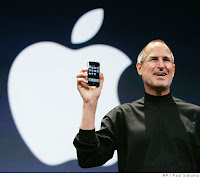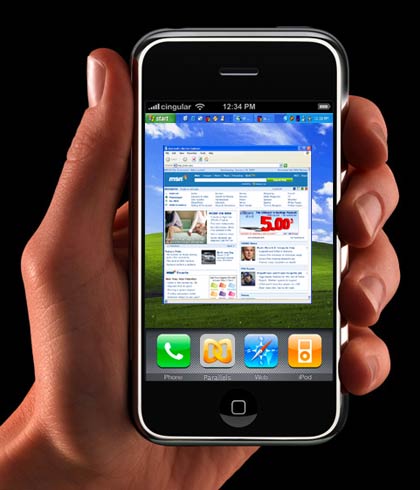
By most accounts, Steve Jobs' much anticipated press conference wasn't as exciting as many had hoped it would be. While there was no news of The Beatles catalogue being added to iTunes, Jobs, Apple’s CEO, did unveil a new version of the iPod Nano. To read more about the conference, click here.
The anticipation surrounding the press conference shows how popular digital music has become and how Apple dominates the market. A key factor in the popularity of digital music is the devices that we can use to access digital media. Prior to iPods and other MP3 players, the dominate form of digital music was the compact disk. While CDs were a vast improvement over cassette tapes, in both the quality of the music and the quality they were able to hold, they required a bulky CD player and music had to be purchased at a brick-and-mortar store, not on-online.

While there were a few MP3 players available to the public in the late 1990s, the first widely successful player, the iPod, was first released in 2001. Along with the iPod, Apple launched the iTunes Store, which allowed users to download music legally.
In seven short years, the technology behind the iPod has greatly improved. Hard drive space has increased from 50 gigabytes to 500, iPods now have the capability to play video, and all iPods now include a color display.
One of the hallmarks of evolving technology is convergence, or combining different media in one unit, and Apple embraced this idea with the iPhone. This unit, launched in 2007, combined all of the features of the iPod, including music storage and playback and video playback, with the features of a cell phone. It also included new technology such as a touch-screen interface and video voicemail. This is the ultimate example of media convergence, and show’s that App le has adapted its product line to embrace new technology.
le has adapted its product line to embrace new technology.
So what’s next for the iPod, iPhone and digital music in general? While Steve Jobs didn’t address this at his press conference, there is, as always, much speculation about what new features will be included in future iPods. I think that it will only be a matter of time before iPod users will be able to access the iTunes store wirelessly directly from their iPods or iPhones. With Wi-Fi becoming increasingly popular, this would be a logical path for Apple to take. But we will just have to wait for Steve Jobs’ next press conference to see exactly what he has in store his iPods.
The anticipation surrounding the press conference shows how popular digital music has become and how Apple dominates the market. A key factor in the popularity of digital music is the devices that we can use to access digital media. Prior to iPods and other MP3 players, the dominate form of digital music was the compact disk. While CDs were a vast improvement over cassette tapes, in both the quality of the music and the quality they were able to hold, they required a bulky CD player and music had to be purchased at a brick-and-mortar store, not on-online.

While there were a few MP3 players available to the public in the late 1990s, the first widely successful player, the iPod, was first released in 2001. Along with the iPod, Apple launched the iTunes Store, which allowed users to download music legally.
In seven short years, the technology behind the iPod has greatly improved. Hard drive space has increased from 50 gigabytes to 500, iPods now have the capability to play video, and all iPods now include a color display.
One of the hallmarks of evolving technology is convergence, or combining different media in one unit, and Apple embraced this idea with the iPhone. This unit, launched in 2007, combined all of the features of the iPod, including music storage and playback and video playback, with the features of a cell phone. It also included new technology such as a touch-screen interface and video voicemail. This is the ultimate example of media convergence, and show’s that App
 le has adapted its product line to embrace new technology.
le has adapted its product line to embrace new technology.So what’s next for the iPod, iPhone and digital music in general? While Steve Jobs didn’t address this at his press conference, there is, as always, much speculation about what new features will be included in future iPods. I think that it will only be a matter of time before iPod users will be able to access the iTunes store wirelessly directly from their iPods or iPhones. With Wi-Fi becoming increasingly popular, this would be a logical path for Apple to take. But we will just have to wait for Steve Jobs’ next press conference to see exactly what he has in store his iPods.

1 comment:
Good post. Along the lines of some of the information I have in my blog. I don't think Apple is going to be going anywhere with their strong stronghold on the digital media player market. You should check out one of my recent posts about a TX school that has freshman get an iPhone or iPod when they come to orientation. This is serious convergence at work at an institution.
Post a Comment